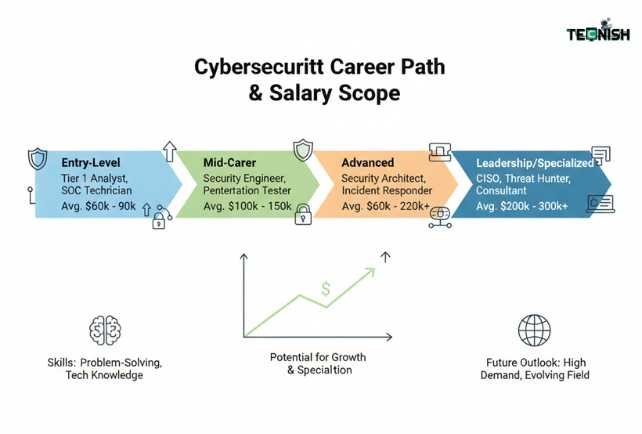Have you ever watched a hacker movie and thought, “Wow, that looks so complicated!”? You’re not alone. Many people search online asking, “Is cybersecurity hard?”, and it’s a fair question. Cybersecurity might look scary, all those codes, dark screens, and mysterious hackers, but it’s not as impossible as it seems.
Simply put, cybersecurity is about keeping computers, phones, and online data safe from bad actors who try to steal or damage them. In 2025, cybersecurity is one of the most important and fastest-growing careers on the planet. According to Scientific Research, there will be 3.5 million unfilled cybersecurity jobs by 2025, highlighting the world’s growing need for digital protectors like you.
But really, is cybersecurity hard to learn? Not if you start slowly, stay curious, and practice a little every day. Learning cybersecurity is like learning to play an instrument , tricky at first, but easier with time.
This article will help you find out how hard is cybersecurity, what makes it challenging, and how to make it easier. We’ll also talk about the cybersecurity career path, cybersecurity roadmap, and how to start learning cybersecurity online for free.
By the end, you’ll understand if cybersecurity is hard for beginners, how to start, and why it might just be the best career decision you ever make.
Understanding Cybersecurity: What Does It Really Mean?

Let’s start simple. Cybersecurity means protecting digital systems , like computers, mobile phones, and networks , from online attacks. Think of it as locking your house door but on the internet.
Cybersecurity professionals are like digital superheroes. They protect personal data, company secrets, and even government networks. To understand how it works, here are the main branches of cybersecurity:
- Network Security – Keeps your Wi-Fi and data connections safe.
- Cloud Security – Protects online storage systems like Google Drive or AWS.
- Application Security – Makes sure your favorite apps are safe from hackers.
- Ethical Hacking Basics – Involves finding and fixing weaknesses before real hackers do.
Different cybersecurity roles vary in complexity. A network security analyst focuses on managing firewalls, while an ethical hacker simulates attacks to test security systems. Each one plays a part in the digital defense chain.
If someone asks, Is cybersecurity hard to learn? the answer depends on the type of cybersecurity you’re interested in. Some roles require coding, while others focus more on analysis and investigation. You can also read our detailed post on Does Cybersecurity Require Coding? to understand when coding is useful.
So, don’t worry , cybersecurity isn’t about being a genius. It’s about understanding risks, solving puzzles, and learning continuously. Whether you’re in school or switching careers, anyone can follow a cybersecurity roadmap with the right mindset.
Why People Think Cybersecurity Is Hard

Many beginners wonder, “Is cybersecurity hard for beginners?” because it sounds super technical. But that fear mostly comes from myths and misunderstandings.
Here are a few common ones:
- “You have to be a hacker to learn cybersecurity.” Not true! Ethical hacking is just one small part. There are dozens of non-hacking roles like analysts, security auditors, and compliance officers.
- “You must be great at coding.” Nope. While basic coding helps, many cybersecurity training courses use tools that are beginner-friendly. Learn more in our article on The Role of Coding in Cybersecurity , it breaks this myth completely.
- “It’s too complicated.” Cybersecurity is more about logic and problem-solving than heavy math or coding.
Sure, technology moves fast, which can make things seem difficult. You’ll need to stay updated and adapt to new threats. That’s why learning never stops in this field , and that’s also what makes it exciting!
Compared to other IT fields, cybersecurity might have a steeper learning curve, but is cybersecurity worth it? Absolutely. Cybersecurity experts protect people’s privacy, prevent billion-dollar data breaches, and make the online world safer.
Reports from (ISC)² show that the global cybersecurity workforce grew by 12% in 2024. So if millions are learning it, it can’t be impossible, right? The key is to keep practicing and stay patient.
For more expert advice on getting started, check out Essential Skills for Cybersecurity Professionals , a must-read for every beginner.
Is Cybersecurity Actually Hard to Learn?
So, let’s answer honestly , is cybersecurity hard or not? The truth is, it depends on you. If you enjoy solving mysteries, using logic, and finding clues, you’ll probably find it fun. But if you dislike computers and hate learning new tools, it might feel a bit tough at first.
Let’s clear some common questions that beginners often ask:
Is Cybersecurity Hard for Beginners?
Not as much as you think! You can start by learning simple topics:
- What is malware?
- What makes a password strong?
- How can you browse safely online?
Those small lessons create a strong foundation.
If you love staying updated on tech and digital safety, check out the Tech Blogs on Tecnish for helpful beginner guides and news about cybersecurity trends.
Essential Skills You’ll Need
To succeed, you need curiosity, patience, and logic. The rest you can learn through tutorials and cybersecurity training courses.
Here’s what helps most:
- Problem-solving: Finding “why” something broke.
- Curiosity: Always exploring how systems work.
- Persistence: Never giving up on tough problems.
How to Learn Cybersecurity Online
You can easily start learning cybersecurity online with platforms like:
- TryHackMe– beginner-friendly labs.
- Hack The Box– real hacking environments.
- Coursera & Udemy– guided courses.
You can follow a full cybersecurity roadmap, beginning with basic courses, then certifications, and finally internships.
Is cybersecurity hard to learn without a degree?
No! Many top professionals are self-taught. The key is practice. Explore learning cybersecurity online with free websites like TryHackMe, Hack The Box, and Cybrary.
To build your base, focus on these cybersecurity skills for beginners:
- Learn how networks work (IP, routers, and firewalls).
- Understand what malware, phishing, and ransomware are.
- Try simple labs and simulations safely at home.
As you grow, consider studying best cybersecurity certifications such as CompTIA Security+, CEH, or Google Cybersecurity Certificate.
So, when someone asks, “How hard is cybersecurity to learn?”, tell them , not hard if you take it step by step. Start small, stay curious, and practice every day.
How to Make Cybersecurity Easier to Learn

Now that you know the basics, let’s look at how to make learning cybersecurity easier and fun.
Here’s a beginner-friendly cybersecurity roadmap to help you:
- Learn the basics of computers and networking.
Understand what an IP address is, how routers work, and what firewalls do. - Study common cyber threats.
Learn how phishing emails or viruses work , these are the puzzles you’ll solve later. - Use free learning labs.
Practice in safe environments like TryHackMe or Hack The Box using virtual machines. - Join online communities.
Connect with learners and experts in forums, Discord servers, or Reddit’s r/cybersecurity. - Take a course or certification.
Explore cybersecurity training courses or cybersecurity courses in USA through Coursera, Udemy, or EC-Council.
If you live in Asia, you’ll find great cybersecurity training opportunities in India and Bangladesh too. These programs are flexible, allowing you to keep learning even while studying or working.
Practicing daily builds confidence , and soon, you’ll stop wondering “is cybersecurity hard?” and start thinking, “Cybersecurity is actually fun!”
Plus, with high cybersecurity salary 2025 projections, even entry-level professionals can earn impressive pay while doing meaningful work.
To explore more learning ideas, tutorials, and step-by-step guides, visit the Main Tecnish Website , your trusted home for tech education.
Real-Life Examples: How Experts Master Cybersecurity
So far, we’ve answered the question “Is cybersecurity hard?”, but nothing explains it better than real-life success stories. Thousands of people have started from scratch , some with zero IT background , and are now respected experts keeping big organizations safe.
Take Aisha, for example. She began learning through free cybersecurity training courses while working a regular job. Within a year, she earned the CompTIA Security+ certification and landed her first analyst position. Now she’s on a six-figure cybersecurity career path helping banks detect and prevent fraud.
Then there’s Rahul, who used online labs like TryHackMe to practice ethical hacking basics. He later completed one of the best cybersecurity certifications from EC-Council and joined a global cybersecurity team.
These stories show it’s not about how much you know at the start , it’s about consistency. Many professionals read platforms like the Cybersecurity Category on Tecnish to stay updated with the latest defensive tools, hacking methods, and industry news.
According to Cybersecurity Ventures, the global cybersecurity industry will reach $300 billion by 2026. That means more demand, higher cybersecurity salary 2025 expectations, and better job security.
So, if you’re asking yourself, “Is cybersecurity worth it?”, the answer is absolutely yes. It’s a field where curiosity meets career growth , and where every challenge teaches you something new.
For fresh insights, browse the Tech News section on Tecnish , we share updates on the latest cyber threats and protection strategies every week.
Cybersecurity Career Path & Salary Scope

Let’s talk about one of the most exciting parts , career and salary. You might wonder, after all this effort, “Is cybersecurity hard , and does it pay off?” Definitely!
There are many paths you can take once you start. Here’s a breakdown of the most common roles on the cybersecurity career path:
| Role | Description | Average Global Salary (2025) |
| Security Analyst | Monitors networks and stops attacks. | $85,000+ |
| Penetration Tester (Ethical Hacker) | Tests systems for weaknesses. | $95,000+ |
| Cybersecurity Engineer | Builds secure systems and tools. | $110,000+ |
| Consultant / Advisor | Helps companies plan security strategies. | $120,000+ |
The cybersecurity salary 2025 report predicts continuous growth because of rising cyber-attacks. In the US, analysts earn between $80K–$150K. In countries like India and Bangladesh, skilled professionals are also seeing rapid increases as local firms invest more in online security.
If you are still confused, then you can read the Simplilearn latest article about the Cybersecurity career path, skills and salary.
No matter where you live, cybersecurity professionals are in high demand. Whether you start in an entry-level analyst role or jump into ethical hacking, there’s always a clear cybersecurity roadmap toward higher pay and specialization.
Common Mistakes Beginners Make in Cybersecurity

Even though cybersecurity is exciting, many beginners fall into simple traps. If you want to avoid frustration while figuring out is cybersecurity hard, watch out for these common mistakes:
- Skipping the basics: Jumping into hacking without learning how networks work leads to confusion. Read Essential Skills for Cybersecurity Professionals first.
- Ignoring practice labs: Theory alone won’t help , spend time in safe labs to apply what you learn.
- Not staying updated: Technology evolves daily; follow reliable sources like Tech News on Tecnish to stay current.
- Learning too many tools too fast: Master one tool at a time instead of trying everything.
- Neglecting soft skills: Communication and teamwork are vital for real-world security jobs.
Cybersecurity isn’t just about tools , it’s about mindset. Take your time, keep practicing, and never be afraid to ask questions. Mistakes are part of the learning process!
Wrapping Up: So, Is Cybersecurity Hard?
After everything we’ve covered, the myths, the learning curve, and the rewards , let’s answer it clearly: is cybersecurity hard?
Yes, it can be challenging, but only at the start. Once you grasp the basics and practice regularly, it becomes fascinating and fun. Like any skill, the more you do it, the better you get.
Cybersecurity is a journey of curiosity, growth, and purpose. Whether you’re studying from home, taking cybersecurity courses in USA, or building labs in your room, you’re joining one of the most in-demand industries in the world.
Remember:
- Every expert was once a beginner.
- Every hack you prevent makes the internet safer.
- Every skill you learn adds to your confidence.
So instead of asking “is cybersecurity hard?”, start asking, “When can I begin?” The world needs more protectors like you.
If you’re serious about building your future, visit the Tech Blogs Section on Tecnish , it’s packed with career guides and insider updates to help you choose your next learning step.
FAQs
To make this guide even more helpful, here are answers to the most searched beginner questions.
1. Is cybersecurity hard for beginners?
Not really! With patience, free labs, and community help, anyone can start learning cybersecurity from home.
2. Can I learn cybersecurity without a degree?
Yes! Many professionals are self-taught. Explore online programs, tutorials, and cybersecurity training courses that fit your schedule.
3. How long does it take to become a cybersecurity expert?
Usually, 1–3 years depending on your dedication. Start small, take certifications, and build practical experience.
4. Is cybersecurity worth it in 2025?
Absolutely. The global demand is exploding, salaries are increasing, and it’s one of the most respected tech careers today.
5. What are the easiest cybersecurity jobs for beginners?
Roles like Security Analyst, Incident Responder, or Vulnerability Tester are great starting points. To see which fits your style, check the detailed guide on Tecnish’s Cybersecurity Category Page.
If you’re ready to dive in, visit Tecnish for easy-to-read guides, industry news, and expert advice. From basic tutorials to advanced tools, you’ll find everything you need to grow in your cybersecurity career.





